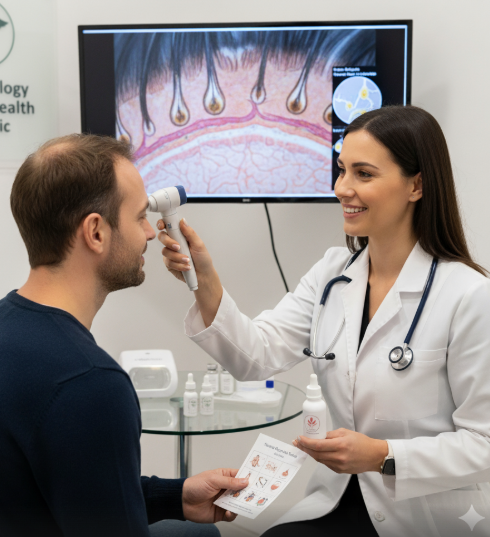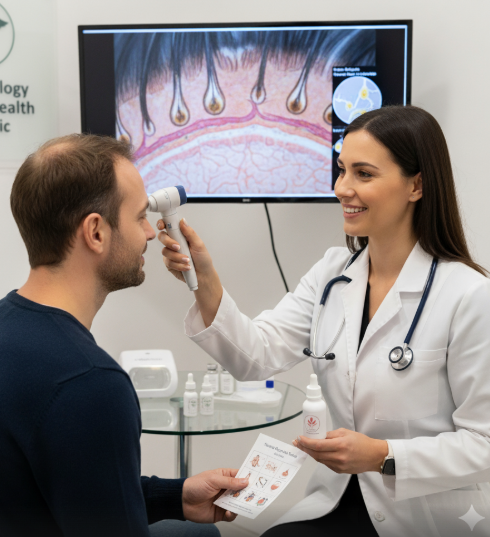Restoring Hair Confidence with a Dermatologist for Hair Loss
Hair is often seen as a symbol of vitality and confidence. Experiencing hair thinning or baldness can impact self-esteem, making professional intervention crucial. Consulting a dermatologist for hair loss provides an evidence-based, personalized approach to restoring hair health and preventing further damage.
This blog explores the causes of hair loss, treatment options, advanced therapies, and the importance of professional care in achieving long-lasting results.
Understanding Hair Loss
Hair loss, medically termed alopecia, affects millions worldwide. Its causes vary, requiring accurate diagnosis for effective treatment:
- Genetic Factors: Androgenetic alopecia, commonly known as male or female pattern baldness, is inherited and progressive.
- Hormonal Imbalances: Thyroid disorders, menopause, and changes in androgen levels can trigger hair shedding.
- Stress and Lifestyle: Poor nutrition, chronic stress, and lack of sleep exacerbate hair loss.
- Medical Conditions and Medications: Autoimmune diseases, scalp infections, and certain drugs contribute to thinning.
- Environmental Factors: Pollution, chemical exposure, and harsh styling weaken hair and follicles.
A dermatologist for hair loss evaluates these factors to develop an effective, targeted treatment plan.
Why Professional Consultation is Essential
Hair loss is multifaceted, and generic remedies may not address the root cause. Consulting a dermatologist offers several advantages:
- Precise Diagnosis: Tools like dermoscopy and scalp imaging help identify specific hair loss patterns.
- Personalized Treatment Plans: Solutions tailored to individual conditions improve outcomes.
- Access to Advanced Therapies: Dermatologists provide medical, non-surgical, and surgical options.
- Preventive Advice: Guidance on nutrition, hair care, and lifestyle helps maintain results.
Professional care ensures safe, effective, and long-lasting hair restoration.
Types of Hair Loss Treated by Dermatologists
Dermatologists specialize in treating various hair loss conditions, including:
- Androgenetic Alopecia: Progressive, hereditary thinning affecting men and women.
- Telogen Effluvium: Temporary shedding triggered by stress, illness, or hormonal changes.
- Alopecia Areata: Autoimmune disorder causing patchy hair loss.
- Scarring Alopecia: Hair loss due to inflammation or follicular damage.
- Traction Alopecia: Hair loss from prolonged tension or certain hairstyles.
Accurate identification of the hair loss type is critical for recommending the most effective treatment.
Non-Surgical Hair Loss Treatments
Not all hair loss requires surgery. Dermatologists offer several non-invasive options:
Topical Medications
Applied directly to the scalp, these promote follicle stimulation and slow hair loss progression.
Oral Medications
Prescription drugs help regulate hormones or promote hair regrowth in certain conditions.
Platelet-Rich Plasma (PRP) Therapy
PRP uses the patient’s blood plasma, rich in growth factors, to rejuvenate dormant follicles.
Low-Level Laser Therapy (LLLT)
Laser treatment enhances scalp circulation, revitalizing follicles and promoting growth.
Scalp Micropigmentation
A cosmetic solution that creates the appearance of fuller hair for early thinning or post-treatment enhancement.
These therapies can be combined to optimize results based on individual conditions.
Surgical Hair Restoration
Advanced hair loss may require surgical intervention for permanent results:
Follicular Unit Extraction (FUE)
Individual hair follicles are extracted from donor areas and implanted in thinning regions. FUE is minimally invasive, leaves no linear scar, and allows faster recovery.
Follicular Unit Transplantation (FUT)
A strip of scalp is harvested from the donor site, and individual follicles are transplanted to balding areas. FUT is ideal for larger coverage and ensures high graft survival.
Combination Approaches
Some dermatologists combine FUE and FUT techniques for maximum density and natural-looking results.
Surgical hair restoration ensures durable and aesthetically pleasing outcomes when performed by a skilled dermatologist for hair loss.
Personalized Hair Care and Maintenance
Long-term success depends on proper care and maintenance:
- Gentle Hair Care: Use mild shampoos and avoid harsh chemical treatments or excessive heat.
- Balanced Diet: Nutrients such as protein, vitamins, and minerals strengthen hair health.
- Lifestyle Adjustments: Managing stress, exercising, and maintaining adequate sleep support follicle health.
- Regular Follow-Ups: Continuous monitoring allows adjustments to treatment plans for optimal results.
Combining professional intervention with healthy routines maximizes hair growth and preserves results.
Preventive Measures to Reduce Hair Loss
Preventive care is essential to minimize further thinning and maintain hair density:
- Avoid hairstyles that pull on hair excessively.
- Protect hair from environmental damage such as UV rays and pollution.
- Maintain a nutrient-rich diet with adequate hydration.
- Seek timely medical evaluation for hormonal or health-related issues.
Following these guidelines complements treatment and enhances long-term hair health.
Psychological Benefits of Hair Restoration
Hair loss can impact emotional well-being and confidence. Effective treatment with a dermatologist for hair loss offers:
- Increased self-esteem and social confidence.
- Reduced anxiety related to appearance.
- Improved overall quality of life and emotional health.
Addressing hair loss professionally provides both physical restoration and psychological reassurance.
Technological Innovations in Hair Restoration
Modern dermatology integrates technology for superior results:
- Robotic Hair Transplants: Enhance precision and reduce recovery time.
- Stem Cell Therapy: Stimulates regeneration of damaged follicles.
- AI-Assisted Diagnosis: Enables accurate scalp mapping and personalized treatment plans.
- Minimally Invasive Procedures: Ensure effective results with faster healing.
These advancements provide more efficient, less invasive, and highly effective solutions for hair loss.
Choosing the Right Dermatologist for Hair Loss
Selecting the appropriate professional ensures optimal outcomes:
- Expertise and Credentials: Verified experience in hair restoration techniques.
- Range of Treatments: Clinics offering surgical and non-surgical therapies provide comprehensive care.
- Patient Testimonials and Case Studies: Demonstrate reliability and effectiveness.
- Advanced Technology: Modern equipment enhances precision and safety.
- Transparent Consultation: Clear explanation of procedures, results, and aftercare builds trust.
A dermatologist for hair loss combines expertise, technology, and personalized care to deliver the best results for each patient.
Conclusion: Restoring Hair and Confidence
Hair loss can significantly impact appearance and self-esteem, but modern dermatology offers effective, personalized solutions. Consulting a dermatologist for hair loss ensures accurate diagnosis, targeted treatment, and long-lasting results. From non-surgical therapies like PRP and laser treatments to surgical options such as FUE and FUT, professional care addresses the root causes and promotes hair restoration.
By combining expert treatment, lifestyle guidance, and ongoing monitoring, individuals can regain hair health, enhance confidence, and achieve sustainable results. Professional intervention transforms not only appearance but also self-esteem, helping patients look and feel their best.








